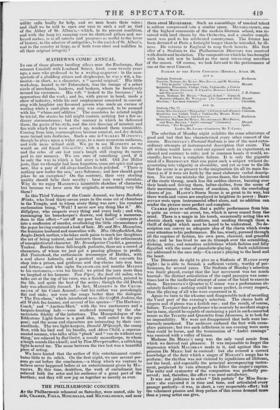MATHEWS'S COMIC ANNUAL.
Ix one of those gloomy bustling alleys near the Exchange, that connect Cornliilf with Lombard Street, lived, some twenty years ago, a man who professed to be a writing-engraver : in the mas- querade of a plodding citizen and shopkeeper, lie was a wit, a hu- morist—in short, as a character, a " special original." His little workshop, heated to SO° Fahrenheit, was the lounge of a select circle of merchants, bankers, and brokers, whom he facetiously termed his customers. His wife " lOoked to the business ;" his apprentices did the work ; and he, with graver in hand, made a show of industry, while his real employment consisted in convul- sing with laughter any favoured person who made an excuse of waning while a card-plate or ring was engraved, to be amused with his " whims and oddities." The anecdotes lie related might be trivial, the stories he told might contain nothing but a few or- dinary circumstances; but the manner in which he delivered them, the gusto of his style, and the rich dressing of mimicry and fun with which they were served up, rendered them irresistible. Coining from him, commonplaces became comical, and dry details were turned into drolleries. Such a one is CHARLES MATHFWs though he plays upon a wider stage, to a more numerous audience, and with more refined skill. We go to see MArnEws as we would an old friend taste-ii-tae ; with a relish for his stories, and the echo of our last year's laugh still ringing its merry peal in our memory. We are sure of something good, if it be only the way in which a bad story is told. Old Joe Miller jests, that we thought bad been forgotten, come out spick and span new, like a pair of old silver-buckles fresh polished. " There is nothing new under the sun," says Solomon; and how should good jokes be an exception? On the contrary, their very sterling quality should belie their novelty : base coin won't circulate. Why do we enjoy MATHEWS'S inimitable sketches of character, but because we have seen the originals, or something very like them?
In this Third Volume of the Comic Annual, we have Bachelor Winks, who lived thirty-seven years in the same set of chambers in the Temple, and to whom every thing was new ; his constant exclamation being, " Well ! I never saw any thing like it." Mr. Sillylynx, who suspects every thing and every body ; and who, rummaging his housekeeper's drawer, and finding a memoran- dum to this effect—" cut off my poor boy's head"—interprets it into a confession of murder, overlooking the little circumstance of the paper having contained a lock of hair. Mr. and Mrs. Masculine, the feminine husband and masculine wife. Mrs. Oberjlachlich, the Anglo-Dutch mother, who takes such pains to teach her daughters the art of being natural, and instructs them in all the refinements of unsophisticated character. Mr. Brandywine Crackit, a genooin e Yankee. Besides these full-length portraits, there are a crowd of characters, of whom we just get a passing glimpse in profile. Bob Tenterhook, the enthusiastic ironmonger of Halifax, with a soul above hobnails, and a poetical mind, that converts his shop into a prison, and gridirons and dog-chains into iron bars and fetters,—and who sighs SHAKSPEARE and mouths MILTON to his customers,—was too literal ; we pitied the man more than we laughed at his humour. Torn Piper, the deaf old sailor, who talks out at the top of his voice, was a finished portrait, painted to the life, and quite the best of the series; though the old Dutch lady was admirably dressed. In fact, MATHEWS is the CRUIK- SHANK of his Comic Annual;—but his author was provokingly fiat and stale; nor were the songs better than the dialogue. " The Fox-chase," which introduced to us Sir Griffith Jenkins, the old Welch fox-hunter, and several of his species—" The Hackney- Coach," and "Auction-Mart," with the two auctioneers and a bargain-hunting lady —were rendered amusing by the cha-
racteristic fidelity of the imitations. The Monopolologue of the Eddystone Light-house is a good idea, well suited to the pur- pose; and the scene and characters are interesting by their veri-
similitude. The two light-keepers, Donald M'Quaigh, the canny Scot, with his bird and his bundle, and Adam Child, a superan- nuated seaman, who talks of his "pluck" and " can do without any thing," are relieved by Bat Owlet, a moody misanthrope, to whom a laugh sounds like a knell; and by Tom Merryweather, a rollicking light-hcarted tar. The scene between the two last was a beautiful piece of acting.
We have hinted that the author of this entertainment contri- butes little to its relish. On the first night, ve saw several per- sons go out before the conclusion,—a thing which we venture to believe never happened before at an entertainment given by MA- THEWS. By this time, doubtless, the work of curtailment has relieved both the actor and his audience of a great part of the burthen; and they will now jog on together as merrily as ever.



























 Previous page
Previous page